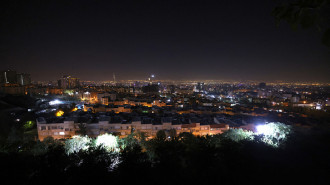Lebanon PM promises $20,000 compensation to victims of Israeli strikes
Lebanese Caretaker Prime Minister Najib Mikati promised to compensate residents of Lebanon who had family members killed or homes destroyed by Israel, Lebanese paper al-Akhbar reported on Wednesday.
Southern Lebanon has been the site of intense cross-border fighting since Hezbollah launched rockets at Israel "in solidarity" with Hamas's surprise 7 October attack.
At least 52 civilians have been killed and 1,000 homes destroyed in Lebanon by Israel since fighting began. Around 91,000 people have been displaced from border regions by the violence.
The Lebanese government plans to give $20,000 to each family of victims, and $40,000 to those whose houses were completely destroyed, according to Al-Akhbar.
Partial compensation will be given to those whose property and crops were damage, contingent on a survey conducted by the southern Lebanese council to assess damages.
The survey has been stalled until now due to ongoing hostilities in south Lebanon.
After the 2006 war between Hezbollah and Israel, Arab Gulf states provided the funding that rebuilt much of south Lebanon.
Hospitals and infrastructure in border villages still bear the names of states, such as Kuwait and Qatar, who funded their reconstruction.
Lebanon's relationship with the Arab Gulf has since soured, as rampant drug trafficking from the state has strained economic and diplomatic relations between them.
In the fall of 2021, several Gulf states severed diplomatic ties with Lebanon after then-information minister referred to them as "bedouins" and criticised their involvement in the war in Yemen.
Widespread destruction in south Lebanon
In its quarterly report to the UN Security Council, the UN peacekeeping force in Lebanon (UNIFIL) noted that Israel launched some 7,948 projectiles at Lebanon since 21 October to 20 February.
UNIFIL observed 978 projectiles fired from Lebanon at Israel, most of which were affiliated with Hezbollah and allied Palestinian militias.
The resulting destruction in Lebanon includes some 10 million square metres of burned forests and olive fields, according to Information International.
South Lebanon is highly dependent upon agriculture for its economy, particularly olive and tobacco farming.
Besides destruction to their farmlands, farmers have been prevented from reaching their crops, leaving fields to fallow, and tobacco being unable to be brought to market.
Lebanese Speaker of the House Nabih Berri is reportedly in discussions to compensate affected tobacco farmers along the Lebanese border.

![Palestinians mourned the victims of an Israeli strike on Deir al-Balah [Getty]](/sites/default/files/styles/image_684x385/public/2024-11/GettyImages-2182362043.jpg?h=199d8c1f&itok=xSHZFbmc)


![The law could be enforced against teachers without prior notice [Getty]](/sites/default/files/styles/image_684x385/public/2178740715.jpeg?h=a5f2f23a&itok=hnqrCS4x)
 Follow the Middle East's top stories in English at The New Arab on Google News
Follow the Middle East's top stories in English at The New Arab on Google News
![Thousands of people have fled from Lebanon to Syria as a result of Israel's war [Getty]](/sites/default/files/styles/image_330x185/public/2024-11/GettyImages-2180619380.jpg?h=199d8c1f&itok=q4PK1BtW)

![Anwar Ibrahim (centre) said that Malaysia would support the Palestinian people against Israel's genocide [Getty]](/sites/default/files/styles/image_330x185/public/2024-11/GettyImages-1742690206.jpg?h=69f2b9d0&itok=ZYgNyRPM)